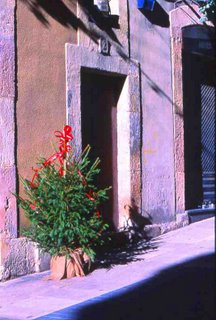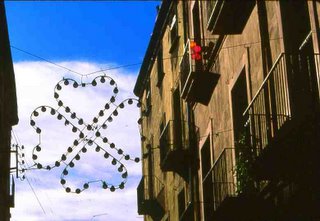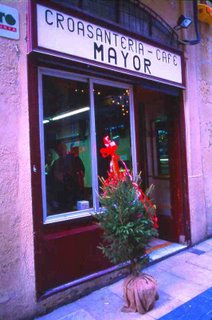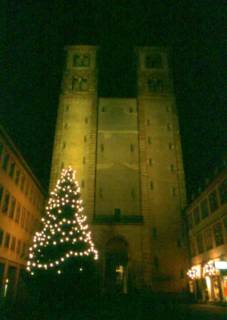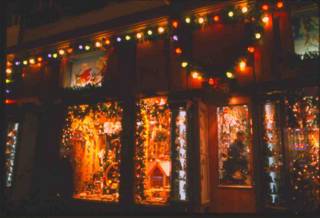
I have a story in
The Ultimate Christmas, published last month and now available in bookstores and online.
I counted on winning the editors' attention when I sent my story for consideration. A yuletide piece about folks gettin' naked stands out from the pack. In the finished anthology, my story appears in the "Christmas Outside the Box" section. I like that.
Christmas in Germany: The Naked Truth
Santa’s a cool guy, and if you ask him to bring your kids’ presents a few days early so you can fly to Europe and experience Christmas in Germany, he delivers. Three hours after Dana and Adam opened their gifts and marveled that Santa would make a special trip to Boston just for them, we were headed to the airport and our flight to Frankfurt.
Ah, what a Christmas! Eating cheese-fondued potatoes in Feuchtwangen and sugar-coated
Schneeballen in Rothenburg. Sipping to-go mugs of hot
Gluhwein while walking cobbled Dinkelsbuhl. Singing
Stille Nacht in a great stone church, strolling outdoor Christmas markets, and browsing festive ornament shops in Heidelberg and Wiesbaden. And in Wurzburg, the first town on our itinerary, we experienced German spa life, which involves lots of dunking. And full frontal nudity.
Our Wurzburg hotel had a
Schwimmbad, a swim and fitness center, and we couldn’t wait to drop our bags and get down there. As we signed in with the girl at the reception desk, I looked through the window behind her at the pool, a sumptuous haven with a waterfall and tropical plants, some dressed for the season in colored lights. Behind one of them stood a buck naked old man.
I turned to the kids and reminded them -- they’d been seeing topless women on Mediterranean beaches since they were toddlers -- that people do things differently in Europe: "You might see a bare body or two in the pool.”
My husband, Mike, had a cold and wasn’t swimming. He claimed a lounge chair and promptly fell asleep. The kids and I found the single dressing room, a unisex affair. That mildly discomfited me – whoa, men in here -- but you could have knocked me over with a Speedo when I realized that our three were the only bathing suits in the whole cedar-planked place. Oblivious to the preponderant nakedness, Adam climbed into his board shorts and Dana into her neon-pink suit adorned with 101 Dalmatians. Wary, but hopeful we’d simply stumbled into the locker room during a naturist group’s annual holiday get-together, I pulled on my suit and led the kids to the pool.
As the warm water and exercise got our juices flowing, our senses sharpened, and we all saw what we’d jumped into. Besides ours, there wasn’t a bathing suit – nary a bikini bottom – to be seen. Instead, body parts we’re unaccustomed to seeing in company, mixed or otherwise, greeted us from all directions – floating, spread across chaises lounges, poised above us on the pool deck.
Taking it in stride, we watched our fellow bathers do “the circuit.” They’d burst from the pool, then amble, flesh flapping, to sauna to steam to tanning bed to
Frischluft, or fresh air, an outdoor concrete courtyard with paintings of palm trees, where people sat chatting in the 15-degree Fahrenheit outdoors in their
Geburtstag suits. We caught the hang of the circuit and began to participate in the series of refreshing events. And that’s when we got into trouble.
One man had deputized himself as the pool police and had been watching our every clothed move. As we’d soon learn, we’d violated the shower-between-events protocol. The enforcer, sometimes nude and sometimes swathed in a red and white-striped robe that made him look like a giant terrycloth candy cane, reported us to the girl at the reception desk, and we were spoken to. After the dressing down, we gave up doing the circuit because all those mandatory showers, besides being wasteful, were way too much work.
So we swam some more, then went to cap off our visit in the sauna. And there waited the Schwimmbad sheriff. When we sat down, he got up and headed for the front desk. A minute later the pool girl tracked me down again and told me there had “been complaints" that we hadn’t sat on towels while in the sauna.
My tired brain, still operating on Eastern Standard Time, called up the best German it could muster, and I delivered a rough equivalent of, "You’re kidding! We’re wearing clothes! We’re the hygienic ones! Please tell peppermint-stick-robe-guy that, in the spirit of Christmas, he should keep his parts and his opinions to himself!” (I was pleased with this sudden burst of fluency. Evidently jet lag lets you speak in tongues.) The pool girl apologized and invited the kids to help themselves to a bowl of oranges at the reception counter.
We woke Mike, dreaming deeply in his chaise. He’d been oblivious to the naked people lounging and walking near him, and he’d missed the drama. Through it all he’d dozed, the most clothed person this pool had ever seen, his cold seeking cure behind long pants, a turtleneck shirt and a sweater.
But he was barefoot. "Where are your shoes?" I asked him.
"Over there. Some guy in a striped robe told me to take them off.”
www.LoriHein.com
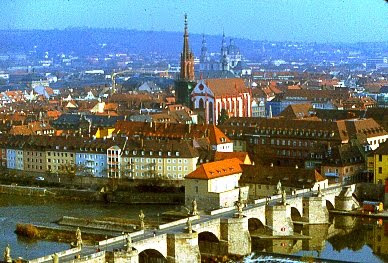
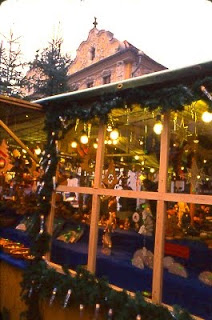

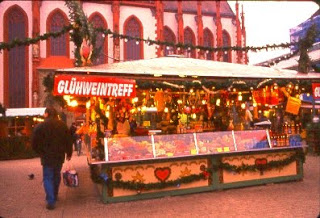

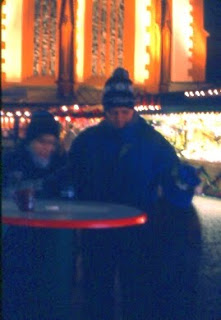










 They once adorned an arch that the Romans built in Constantinople (today's Istanbul). And the Romans allegedly nabbed the equine arch decorations from Greece...
They once adorned an arch that the Romans built in Constantinople (today's Istanbul). And the Romans allegedly nabbed the equine arch decorations from Greece...




